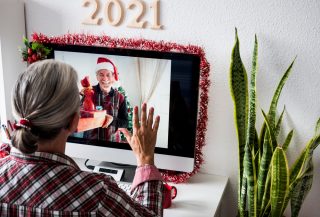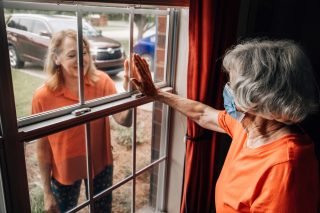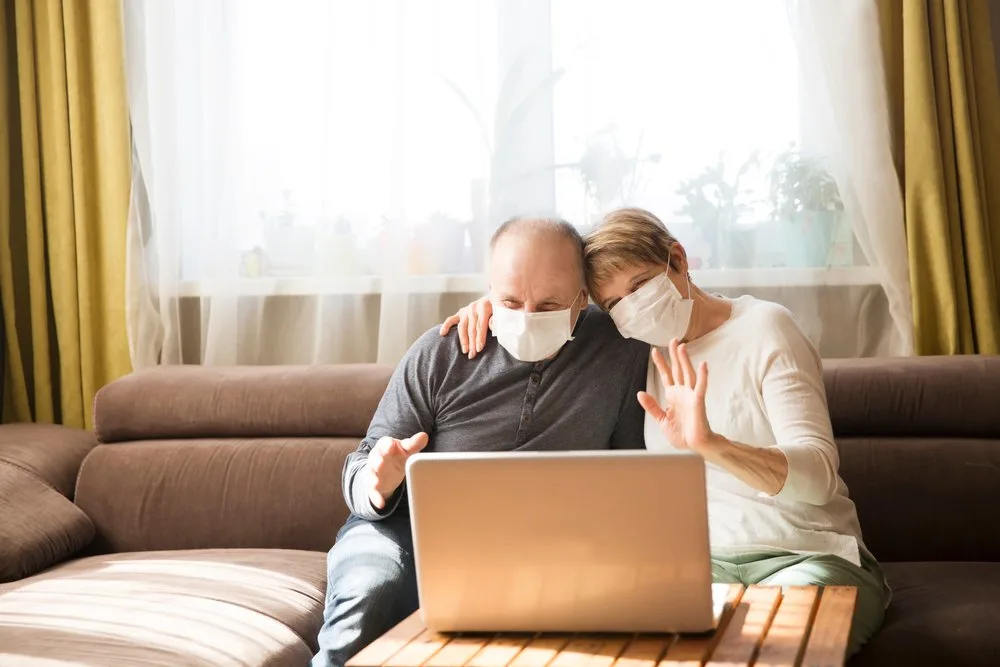The COVID-19 pandemic is an integral part of the perfect storm facing the mental health system. The stress related to the contagion, uncertain economic conditions, as well as social disruption leave many people feeling overwhelmed and expose the shortcomings of the mental healthcare system.
Some groups of people are naturally more susceptible to the stress caused by the pandemic than others. First responders and health care providers belong to these high-risk groups. America’s current economic landscape is also difficult for children, people working in the food industry, as well as individuals with a previous history of mental illness. But the physical, as well as psychological harm resulting from the virus, may affect members of the senior community disproportionately.
It’s a lonely world
The feelings of loneliness that result from social isolation is a problem for many people over 65, even in the best of times. The social distancing efforts mandated by the COVID-19 pandemic only exacerbate the difficulties that stem from social isolation. A study completed at the University of California demonstrated that two out of five seniors regularly battle the negative emotions associated with loneliness. These feelings are often a good predictor of future illness and, in some cases, death.
While combatting the effects of senior isolation should be a top priority for caregivers and loved ones, preventing physically-devastating household accidents is of increasing importance. Falls represent the most significant physical threat to seniors while in their homes and account for one in four elderly hospitalizations. The Centers for Disease Control and Prevention reports that one in three senior citizens experiences a fall each year. Unfortunately, one senior citizen dies every 19 minutes from a fall in the United States, specifically.

Lucigerma/Shutterstock
Experts suggest protecting elderly individuals from these threats with a medical alert system, like Lively Direct. With these technological innovations at our aid, we can collectively combat this epidemic of fall-related deaths.
Staying connected
It can become challenging for families to stay connected to their loved ones while dealing with the social distancing protocols used to slow the spread of COVID-19. However, the health and mental well-being of elderly individuals may very well depend on maintaining these connections. The good news is there are a few practical ways available to families who want to stay connected to older relatives during the pandemic.
Calls and texts
The telephone is a simple and effective way to keep communication lines open with older family members. Your loved one will appreciate knowing that you and other family members set aside time each day to talk to them.
Even amid the Digital Age, some older people have not yet got the hang of texting, but text messages are great for letting a loved one know you are thinking about them when you’re unable to talk on the phone for long periods.
Video chats
Video calls allow for more feelings of closeness than phone calls. Several apps are available to facilitate your chats with loved ones, including Facebook Messenger, WhatsApp, Skype, Facetime, Google Duo.
Care packages
You can remind your elderly loved ones how much they mean to you by regularly sending packages filled with their favorite books, as well as puzzles and treats. These packages will also provide a subject for conversation during the next phone call or video chat.
Letters and cards
It’s easy to forget how good it feels to receive a hand-written letter or special card in today’s high-tech world. However, these options are only two of the many thoughtful ways you can stay in touch with elderly loved ones.
Window visit

Ursula Page/Shutterstock
Families with loved ones living in assisted living facilities can put a smile on the face of a loved one and support the safety efforts of the facility by scheduling a window visit. These visits are growing in popularity. They consist of the families sitting outside while communicating through phones, signs, and other creative ways with their loved ones. Unlike phone calls, these visits allow for much-needed face-to-face interaction.
Virtual vacations
The fact that many museums, resorts, and other public destinations reserved for fun are closed doesn’t have to stop you from clearing your itinerary and planning virtual visits with your loved one. Free online tours are available for popular locations like New York City’s Guggenheim Museum, the Louvre museum in Paris, and Yellowstone National Park. These locations and many more are available for your family’s enjoyment through the use of a smart device. Other popular destinations for online visits include:
- The Great Wall of China
- San Diego Zoo
- Disney World
- Eiffel Tower
- Georgia Aquarium
- Metropolitan Museum of Art
The bottom line
The isolation resulting from COVID-19 safety protocols can negatively affect the mental health of anyone. Sadly, seniors are more susceptible to the anxiety and depression that often accompanies social isolation. Families with elderly members should use all the methods available to stay connected with them during the pandemic.





![women [longevity live]](https://longevitylive.com/wp-content/uploads/2020/01/photo-of-women-walking-down-the-street-1116984-100x100.jpg)









